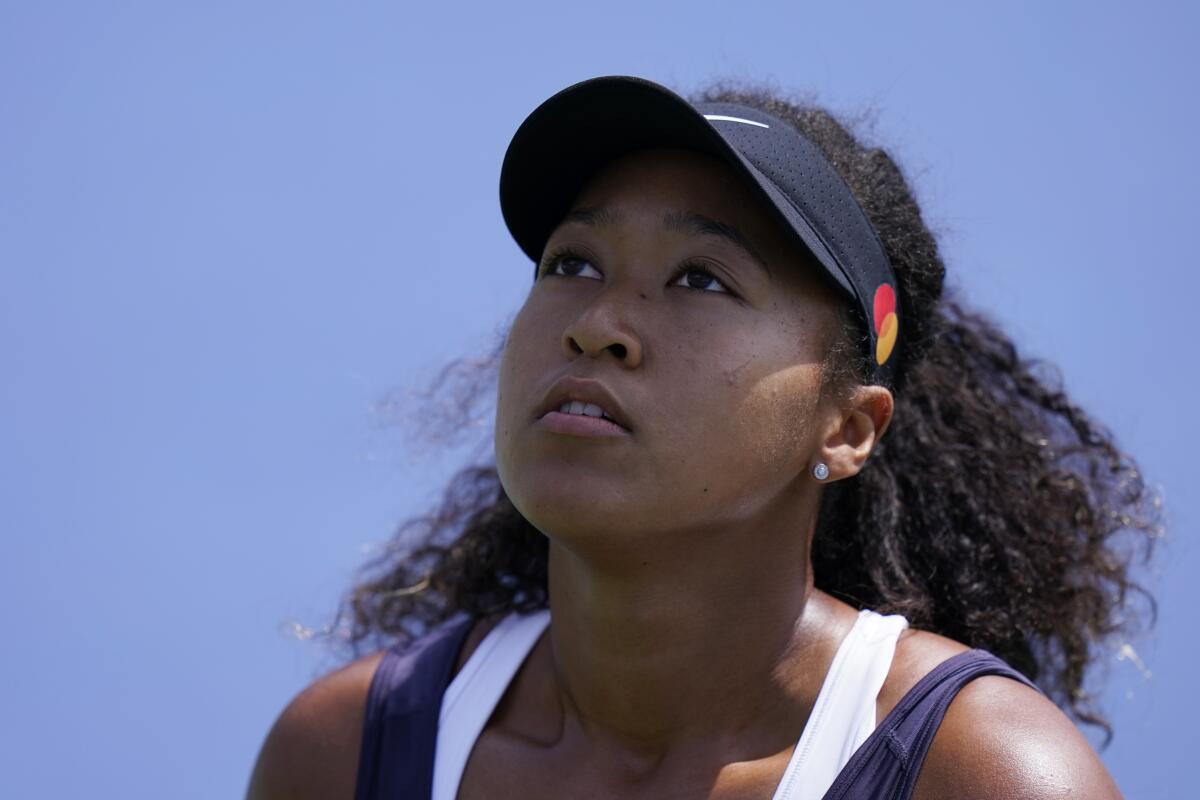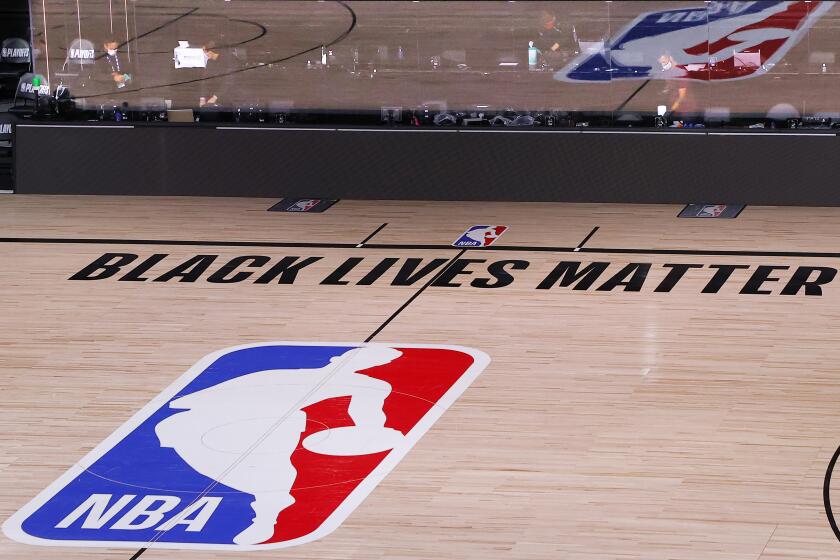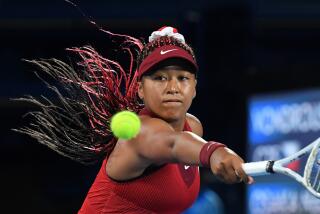Naomi Osaka stood tall, and alone, in protest following Jacob Blake shooting

- Share via
The Milwaukee Bucks stood together after they refused to take the court for a playoff game against the Orlando Magic on Wednesday, finding strength in numbers as they repeated fervent pleas for racial justice.
After the Dodgers decided they couldn’t be silent about the shooting of Jacob Blake by police in Kenosha, Wis., outfielder Mookie Betts, manager Dave Roberts and pitchers Clayton Kershaw and Kenley Jansen stood shoulder to shoulder at a news conference to say they couldn’t play the San Francisco Giants and pretend nothing had happened.
Tennis player Naomi Osaka stood alone when she withdrew from the Western & Southern Open in New York on Wednesday, hours after she had battled back from a set down to defeat Anett Kontaveit and reach the semifinals. She had no teammate to lean on, no one vowing to have her back, when she gave up a shot at a $285,000 paycheck and an opportunity to get precious match-play experience before the U.S. Open begins next week at the same venue.
Her bravery, likely lost on most sports fans while wildcat player strikes spread from the NBA to the WNBA, MLS and Major League Baseball, drew an extraordinary response from tennis executives. In deference to her status as a two-time Grand Slam tournament singles champion and cultural icon, the U.S. Tennis Assn. and Women’s Tennis Assn. scrapped Thursday’s matches to “recognize this moment in time.” Believing that her point had been made and that she can best amplify her advocacy by playing, Osaka agreed to take the court for her match against Elise Mertens on Friday, her representatives confirmed.
Osaka’s reversal was not a retreat. Jumping back in took as much courage and commitment as withdrawing. Maybe more. “As you know, I pulled out of the tournament [on Wednesday] in support of racial injustice and continued police violence. I was (and am) ready and prepared to concede the match to my opponent,” she told the Guardian newspaper on Thursday. “However, after my announcement and lengthy consultation with the WTA and USTA, I have agreed at their request to play on Friday. They offered to postpone all matches until Friday and in my mind that brings more attention to the movement. I want to thank the WTA and the tournament for their support.”
Osaka, daughter of a Haitian father and Japanese mother, was alone but not afraid when she put her convictions above playing another couple of matches. At 22, she has become a singular figure during a singular time in which athletes are affirming their power in new ways.
Athletes in the NBA, WNBA, MLB, MLS, NFL, NHL and professional tennis refused to take part in scheduled events in protest of the shooting of Jacob Blake.
“Hello, as many of you are aware I was scheduled to play my semifinals match [on Thursday],” she said in her initial statement on Wednesday. “However, before I am an athlete, I am a black woman. And as a black woman I feel as though there are much more important matters at hand that need immediate attention, rather than watching me play tennis.
“I don’t expect anything drastic to happen with me not playing, but if I can get a conversation started in a majority white sport I consider that a step in the right direction. Watching the continued genocide of Black people at the hand of the police is honestly making me sick to my stomach. I’m exhausted of having a new hashtag pop up every few days and I’m extremely tired of having this same conversation over and over again. When will it ever be enough?”
She added the hashtags #JacobBlake, #BreonnaTaylor, #Elijah Mcclain, #George Floyd.
Her words were applauded within the tennis world. “Say it louder! Proud of you,” Sloane Stephens, the 2017 U.S. Open women’s champion, said in retweeting Osaka’s statement. Said Billie Jean King, long a champion of equality: “A brave & impactful move by @naomiosaka, in support of the protest movement moving through the sports world. [ ... ] Athletes using platforms for good means so much. Don’t remain silent.”
Osaka, who won the U.S. Open in 2018 and followed by winning the Australian Open in 2019, has felt the sting of racism in her native Japan — which she left at a young age to live in the U.S. — and on the international tennis circuit. She has spoken of being mocked for her thick, curly hair and her skin color, of being labeled as different at an age when being an outsider is a social disaster.
She is thoughtful and introspective, prone to downplaying her successes and focusing on her few tennis shortcomings. She has always been attuned to injustice beyond the tennis court, but her schedule rarely allowed her to follow her heart. When the COVID-19 pandemic hit and the tennis tours were suspended, she participated in social justice protests in Minneapolis, where George Floyd died in May after an officer pressed a knee to his neck, and in Los Angeles, which recently became her home.
“It’s a reset that perhaps I greatly needed. I asked myself, ‘If I couldn’t play tennis, what could I be doing to make a difference?’ I decided it was time to speak up,” she wrote on her Facebook page in May. “I flew to Minneapolis with my boyfriend days after the murder to pay our respects and have our voices heard on the streets. We grieved with the people of St. Paul and protested peacefully. We visited the George Floyd memorial and connected with those who came together to mourn yet another senseless act and life lost without reason. Being on the ground in Minneapolis was what felt right at that moment.”
Stepping off the court felt right to her until she realized she could best advance her cause by using both her racquet and her voice. She may stand alone, but she stands tall.
More to Read
Go beyond the scoreboard
Get the latest on L.A.'s teams in the daily Sports Report newsletter.
You may occasionally receive promotional content from the Los Angeles Times.












